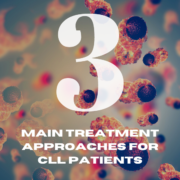Three Main Treatment Approaches for CLL Patients
What are the main treatment approaches for Chronic Lymphocytic Leukemia (CLL) patients? In the “CLL Treatment Approaches: What Are the Types?” program, expert Dr. Catherine Coombs from The UNC Lineberger Comprehensive Cancer Center outlines CLL treatment options and patients they may work best for.
1. BTK Inhibitor Targeted Therapy
The CLL treatment approach of BTK inhibitors work against the function of Bruton’s tyrosine kinase protein. Bruton’s tyrosine kinase – or BTK – is involved in signaling processes in both cancerous and healthy B cells, and BTK inhibitors exert against B cells to prevent cancer growth. Acalabrutinib (Calquence) and ibrutinib (Imbruvica) are two BTK inhibitors currently approved for CLL treatment. In general, patients are kept on BTK inhibitors if they are working well and with minimal side effects, as BTK inhibitors generally work extremely well against controlling CLL over time. Due to their success over time, BTK inhibitors are an excellent treatment option for more elderly patients.
2. BCL-2 Inhibitor Targeted Therapy
Another CLL treatment approach is BCL-2 inhibitors, which work against the pathway that lies within CLL cells. The process of CLL cell death and BCL-2 inhibitors create is called apoptosis. The drug that falls under the category of BCL-2 inhibitors for CLL treatment is venetoclax (Venclexta). An anti-CD20 drug – such as obinutuzumab (Gazyva) – is usually combined with venetoclax to work as a team to kill CLL cells. BCL-2 inhibitors are designed as a shorter term therapy to get patients to remission status, and then they can go off the treatment for regular monitoring after they achieve remission.
3. Cytotoxic Chemotherapy
Though targeted therapies comprise the majority of CLL treatment for patients, cytotoxic chemotherapy is used for some patients. Although cytotoxic chemotherapy is effective, this therapy also has the drawbacks of being less effective than targeted therapies and can cause long-term toxicities in patients.
CLL patients have different treatment options depending on age, lifestyle, and other treatment factors. If you want to learn more about CLL care and treatments, check out our CLL information.










